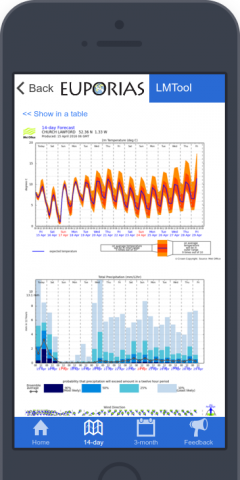En el marco del proyecto EUPORIAS (7º Programa Marco de la UE), se desarrollaron varios servicios climáticos a medida para diferentes sectores. Predictia participó en el desarrollo de algunos de ellos, como el Land Management Tool, cuyo objetivo era ayudar a agricultores del sudeste del Reino Unido con sus decisiones invernales. Para ello, facilita a estos agricultores predicciones estacionales del próximo invierno así como previsiones meteorológicas para los próximos 14 días. Toda esta información se proporciona tanto a través de la web como con una aplicación móvil específicamente desarrollada para este servicio.
Este trabajo se ha plasmado en un artículo, The land management tool: Developing a climate service in Southwest UK, que acaba de ser publicado en la revista de acceso abierto Climate Services. El resumen de este artículo puede leerse a continuación en inglés:
Seasonal climate forecasts (SCFs) have significant potential to support shorter-term agricultural decisions and longer-term climate adaptation plans, but uptake in Europe has to date been low. Under the European Union funded project, European Provision Of Regional Impacts Assessments on Seasonal and Decadal Timescales (EUPORIAS) we have developed the Land Management Tool (LMTool), a prototype seasonal climate service for land managers, working closely in collaboration with two stakeholder organizations, Clinton Devon Estates (CDE) and the National Farmers Union (NFU). LMTool was one of several prototype climate services selected for development within EUPORIAS, including those for the UK transport network, food security in Ethiopia, renewable energy production, hydroelectric energy production in Sweden, and river management in two French basins. The LMTool provides SCFs (1–3 months ahead) to farmers in the Southwest UK, alongside 14-day site specific weather forecasts during the winter months when the skill of seasonal forecasts is greatest.
We describe the processes through which the LMTool was co-designed and developed with the farmers, its technical development and key features; critically examine the lessons learned and their implications for providing future climate services for land managers; and finally assess the feasibility of delivering an operational winter seasonal climate service for UK land managers.
A number of key learning points from developing the prototype may benefit future work in climate services for the land management and agriculture sector; many of these points are also valid for climate services in other sectors. Prototype development strongly benefitted from; working with intermediaries to identify representative, engaged land managers; an iterative and flexible process of co-design with the farmer group; and from an interdisciplinary project team. Further work is needed to develop a better understanding of the role of forecast skill in land management decision making, the potential benefits of downscaling and how seasonal forecasts can help support land managers decision-making processes. The prototype would require considerable work to implement a robust operational forecast system, and a longer period to demonstrate the value of the services provided. Finally, the potential for such services to be applied more widely in Europe is not well understood and would require further stakeholder engagement and forecast development.

